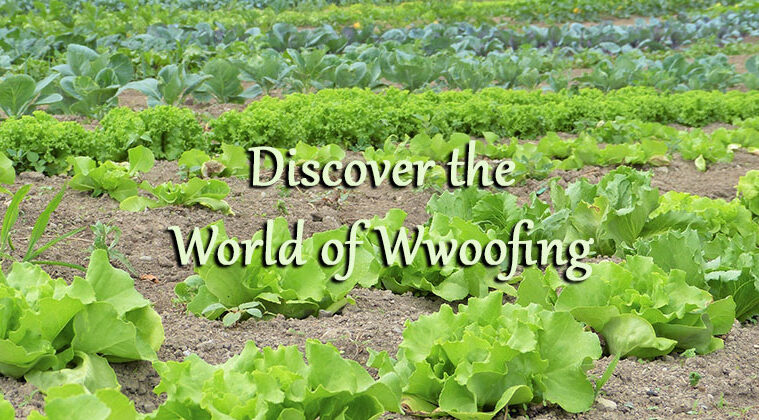What if you could travel the world for free, learn to grow and eat off the land, and meet amazing like-minded people — all with tender regard for the sustainability and care of the planet? Sound familiar? If not, then you have not yet entered into the world of wwoofing!
All Things Organic
Just imagine packing your bags and flying to the countryside of Bali where a permaculture farm awaits you to do hands-on work in the rich, fertile soil – for free! Wwoofing will get you there.
“WWOOF” stands for World Wide Opportunities on Organic Farms. This international organization connects traveling volunteers with agricultural farmers in exchange for cultural and educational learning. And though it may sound new-age, it’s actually been around for over 50 years. (1)
Unfortunately, we live in the post-Covid Era now, where online zoom meetings have become the norm. In contrast, wwoofing seeks to provide “a going back to nature” model which incorporates a more down-to-earth, hands-on, and green thumb approach to education.
As the movement grew, so did the number of organizations involved. So in 2012, the Federation of WWOOF Organizations (FoWO) was born in an attempt to unite the efforts into one body so as to promote, protect, and support the mission. From its humble beginnings in 1971 UK as a cultural exchange program, wwoofing now operates in more that 130 countries worldwide.
Ground-Level Operations
So how exactly does one go about wwoofing? Volunteers willingly choose to pack their belongings and travel to a foreign culture. There they meet with friendly faces who show them the land they are to work for about 4-6 hours a day. (2)
On top of this, their food and housing accommodations are provided for as they are introduced to a more sustainable form of living from Mother Nature. The tasks can include, but not limited to, sowing seeds, making compost, gardening, planting, cutting wood, weeding, harvesting, packing, milking, feeding, fencing, making mud-bricks, wine making, cheese making and bread making.
Just imagine being in a Brazilian country forest and harvesting raw honey from the apiary that you help keep. Sweet, right? The duration of visit can vary from two to three days or up to 6 months.
Wwoofing In Action: Listen to one wwoofer describe her amazing experience…
“For the past three weeks, I’ve been living on a permaculture farm in Bali—for free. To say life is peaceful here is an understatement. I wake up surrounded by lush green plants, do a relaxing round of yoga, and go to work on the farm a few hours after breakfast, where I form crop beds, pull weeds, and cut compost according to regenerative principles. Then I meditate until dinner. Did I mention I am staying here for free?…
“In exchange for six hours of work every weekday, I get three meals a day and a private room in return. The food is all vegetarian and organic—I eat bok choy, lettuce, spinach, and young papaya straight from the garden. Any mosquito bites or sun burns, I walk three feet from my room and cut a stalk from the abundance of aloe vera….Basically, it’s the best way to travel for those who want to spend very little money and try something a little out-of-the-box. It’s arguably one of the best, and most affordable, ways to see the world.” (3)
Getting Off Grid
We live in a highly technologically advanced society, and things are not getting any less complex. With the rise of virtual reality and artificial technology, to step out into a twitterless world seems like entering into a new dimension. It’s a challenge to tap into our origins and be human again. Living off the garden means you get the ability to enjoy the food you have earnestly cultivated with sweat and perhaps even blood and tears.
Wwoofing also employs a cost-effective means of experiencing another culture. You’ll not only learn a new language but also engage in a form of education that can ennoble mind, body, and spirit. Additionally, enjoy the bonus of meeting new (possibly lifelong) friends, visiting local cultural resorts, as well as fresh country air and water. Did I mention sunshine? Yes, the list goes on!
Notes Of Caution
However, it should be noted that wwoofing can be a problem for the physically disabled. If you have health challenges that prevent labor-intensive work, then this may not be your cup of tea.
Since this is not a regulated industry, anyone going through the “slow tourism” experience should be conscious that there are assumed codes of conduct. This would apply for both the farm and themselves in order to prevent abusive situations as much as possible. (4)
Taking Action
If you want to get away from the din of the cities, then wwoofing might just be for you. This adventure will get you outside of the cities and into the country farm experience. Wwoofing may just be the adventure of a lifetime!
But maybe wwoofing isn’t for you. And that is great, too, because there are ways to support others on this journey.
As an alternative, you can support others through the Fruit Tree Planting Foundation, David Wolfe’s nonprofit organization. – to keep the organic lifestyle of farming growing in all corners of the globe. Feel free to visit https://www.ftpf.org/ for more information.



